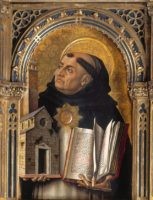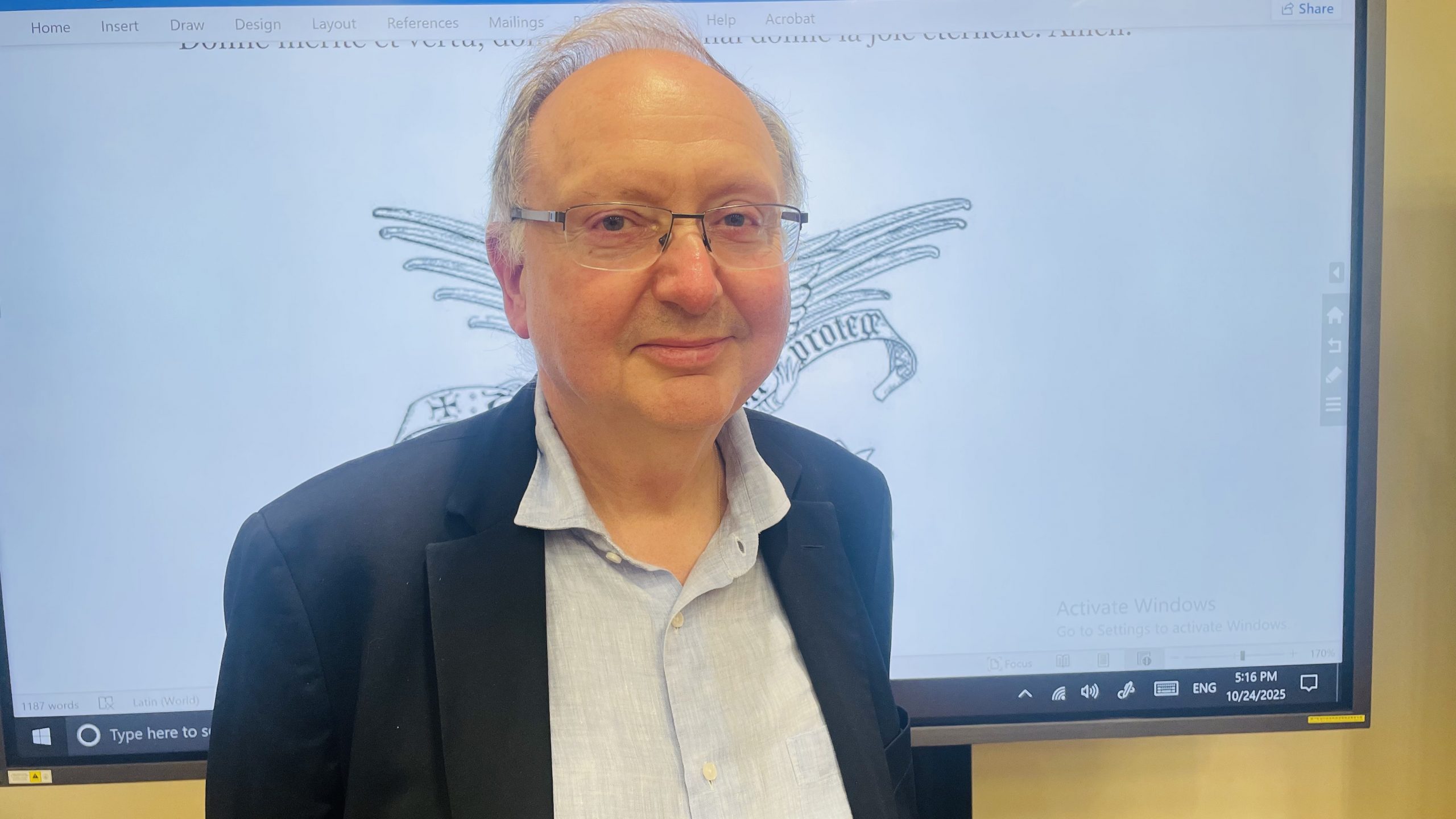– Aurelio Porfiri
I happened to read recently an article in Il Timone celebrating Mario Palmaro, a noted Catholic thinker who died a few years ago of a serious illness. A sentence he wrote struck me: “It is not the Pope who creates the truth, the Pope is the guardian, it is not that a thing is true because the Church has said it, but the Church says it, because it is true.”
This phrase came to my mind when I reflected on St Thomas Aquinas (1226-1274), an ever-shining star of Catholic thought and, therefore, a patrimony of all humanity. Until not long ago, being a Thomist was a sure sign of being a Catholic who followed orthodoxy, what is right to believe, rather than orthopraxis, a vague “to behave well” (but according to what?) But orthopraxis has no meaning if deprived of orthodoxy, because my behavior will not be correct if it is not correctly guided.
The thought of our humble Dominican friar, Thomism, has guaranteed a shelter from the drift of the intelligence that craved the celebration of itself (the French Marcel de Corte should be re-read for a healthy development of this concept) guaranteeing a return to the truth of the things. It is said that at the beginning of his lectures St Thomas showed an apple to his attendees and stated: “This is an apple. If you do not agree, you can leave.” What did it mean? It meant and it means that there can be no discourse that does not start from accepting the truth of things for what they are. In the wake of a not only Christian tradition of thought, he defined truth as adaequatio rei et intellectus, that is the intellect that adapts to the truth of things. This healthy realism protects us from practicing a religion that is based on the contortions of the intellect on itself, it allows us to say true things because they are true in themselves, not because we say them.
Father Enrico Zoffoli in his San Tommaso d’Aquino (1995 Edizioni Segno) described the legacy of the great thinker as follows: “At forty-nine, Thomas Aquinas made us heirs to one of the most original and powerful syntheses of human thought of all times, articulated in a literary production that astounds …. The richness of the sources of his thought is so great. Aquinas knows very well (and even remembers from memory) the most important ones among the Fathers of the Greek and Latin Church, as also appears from his Catena aurea in Evangelia. The “wild and rugged and strong forest” of the works of St. Augustine is familiar to him. He is informed of all writers and ecclesiastical documents, from the origins to his times. He dominates the whole of Greek and Latin literature, from historians to naturalists, from poets to philosophers and jurists … In the field of Aristotelian bibliography he does not fear rivals, knowing the commentaries of the Stagirite, ancient and contemporary, Arabs, Jews, Christians. It is no exaggeration if he is considered the most intelligent heir of the entire ancient culture of the West.”
We were talking about the realism of St Thomas: “It is thanks to his realism that he opens the way that leads to faith in the conquest of those reasons of credibility that make it the most careful and happy overcoming of reason …” (E. Zoffoli, op cit.).
Thomas keeps us anchored to the world precisely in order to overcome it in a higher synthesis and teaches us that Christianity does not reject reality, as was typical of some heretical tendencies within Christianity itself or as it is characteristic of some Eastern religions, but penetrates it. He understands and accepts, and only after this does he reach beyond it for a greater Reality.
A Thomist as profound as Antonio Livi sees Thomism in this way: “Aquinas, apart from the greatness and originality of his speculation, is also the author of a theoretical synthesis in which figure Plato, Aristotle, Neoplatonism, Patristic thought, Arab and Jewish philosophy: Thomistic philosophy can therefore easily lend itself to a discourse of confrontation and connection between ancient and medieval thought, and then between the medieval and the modern. A characteristic of Thomistic philosophy is the perfect coherence of typical gnoseological elements of empiricism with those that would seem to characterize intellectualism. In reality, it must always be remembered that St Thomas has constant attention to the unity of the system of truth, of experience, which means unity between sensible perception and intellectual knowledge, between the prima operatio intellectus and judgment, between intellectus and ratio: unity, certainly, in the distinction, which is analytically specified by Thomist gnoseology, but never reaches the point to attribute autonomous value to one of the individual moments of knowledge” (2007 Senso comune e logica aletica).
In the Encyclical Aeterni Patris (1879), Pope Leo XIII thus identified the contribution of Thomas Aquinas to the tradition of Christian thought: “Among the Scholastic Doctors, the chief and master of all is Thomas Aquinas, who, as Cajetan observes, because ‘he most venerated the ancient doctors of the Church, in a certain way seems to have inherited the intellect of all.’ The doctrines of those illustrious men, like the scattered members of a body, Thomas collected together and cemented, distributed in wonderful order, and so increased with important additions that he is rightly and deservedly esteemed the special bulwark and glory of the Catholic faith. With his spirit at once humble and swift, his memory ready and tenacious, his life spotless throughout, a lover of truth for its own sake, richly endowed with human and divine science, like the sun he heated the world with the warmth of his virtues and filled it with the splendor of his teaching. Philosophy has no part which he did not touch finely at once and thoroughly; on the laws of reasoning, on God and incorporeal substances, on man and other sensible things, on human actions and their principles, he reasoned in such a manner that in him there is wanting neither a full array of questions, nor an apt disposal of the various parts, nor the best method of proceeding, nor soundness of principles or strength of argument, nor clearness and elegance of style, nor a facility for explaining what is abstruse. Moreover, the Angelic Doctor pushed his philosophic inquiry into the reasons and principles of things, which because they are most comprehensive and contain in their bosom, so to say, the seeds of almost infinite truths, were to be unfolded in good time by later masters and with a goodly yield. And as he also used this philosophic method in the refutation of error, he won this title to distinction for himself: that, single-handed, he victoriously combated the errors of former times, and supplied invincible arms to put those to rout which might in after-times spring up. Again, clearly distinguishing, as is fitting, reason from faith, while happily associating the one with the other, he both preserved the rights and had regard for the dignity of each; so much so, indeed, that reason, borne on the wings of Thomas to its human height, can scarcely rise higher, while faith could scarcely expect more or stronger aids from reason than those which she has already obtained through Thomas. For these reasons most learned men, in former ages especially, of the highest repute in theology and philosophy, after mastering with infinite pains the immortal works of Thomas, gave themselves up not so much to be instructed in his angelic wisdom as to be nourished upon it. It is known that nearly all the founders and lawgivers of the religious orders commanded their members to study and religiously adhere to the teachings of St Thomas, fearful lest any of them should swerve even in the slightest degree from the footsteps of so great a man. To say nothing of the family of St Dominic, which rightly claims this great teacher for its own glory, the statutes of the Benedictines, the Carmelites, the Augustinians, the Society of Jesus, and many others all testify that they are bound by this law.”
Unfortunately it is not rare today to see a rejection of Thomism even in venerable religious congregations in the name of adherence to a modern thought that is not only a departure from Thomism but, perhaps because of this distancing, even a rejection of the natural progression of reason. Saint Pius X stated in Pascendi (1907) that a clear indication of the advance of modernism is in the rejection of scholasticism, hence of the thought of Thomas who is the heart of it. But all those who have at heart the use of reason should have recourse to Thomism.
A Thomist like Cardinal Dino Staffa could say: “Thomist philosophy, although prescribed by the Church, does not cease to be philosophy, that is, an exclusive work of reason. The authority that imposes it does not intend to replace the demonstration and the intrinsic evidence of its conclusions” (1989 Il Tomismo è vivo).
In short, St Thomas Aquinas belongs to humanity precisely because he starts from the factual data of reality.


 Follow
Follow


